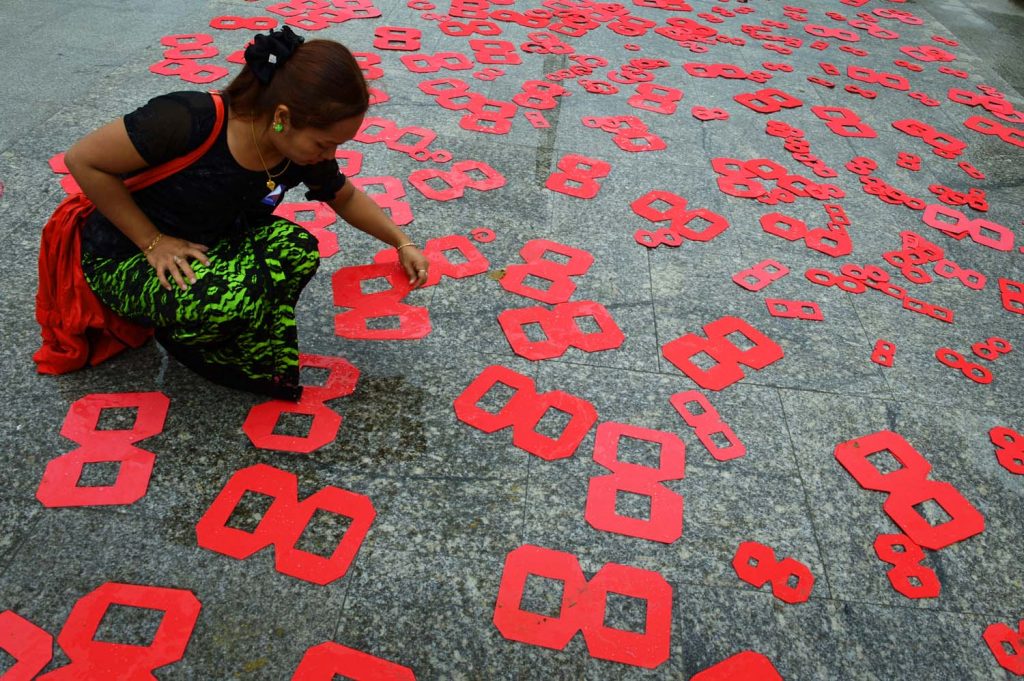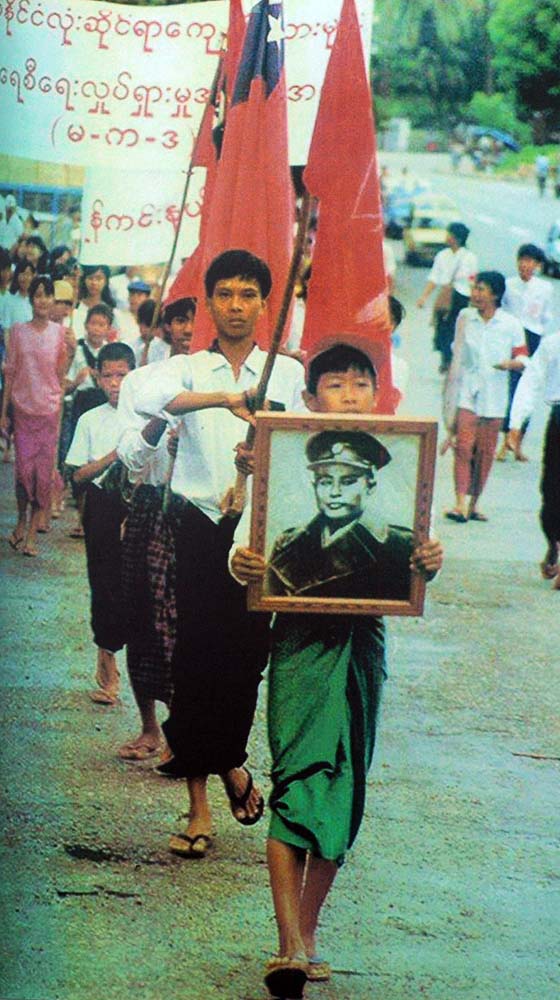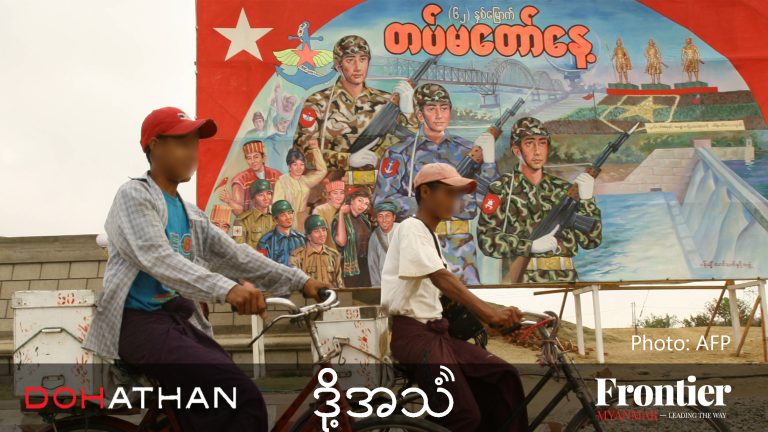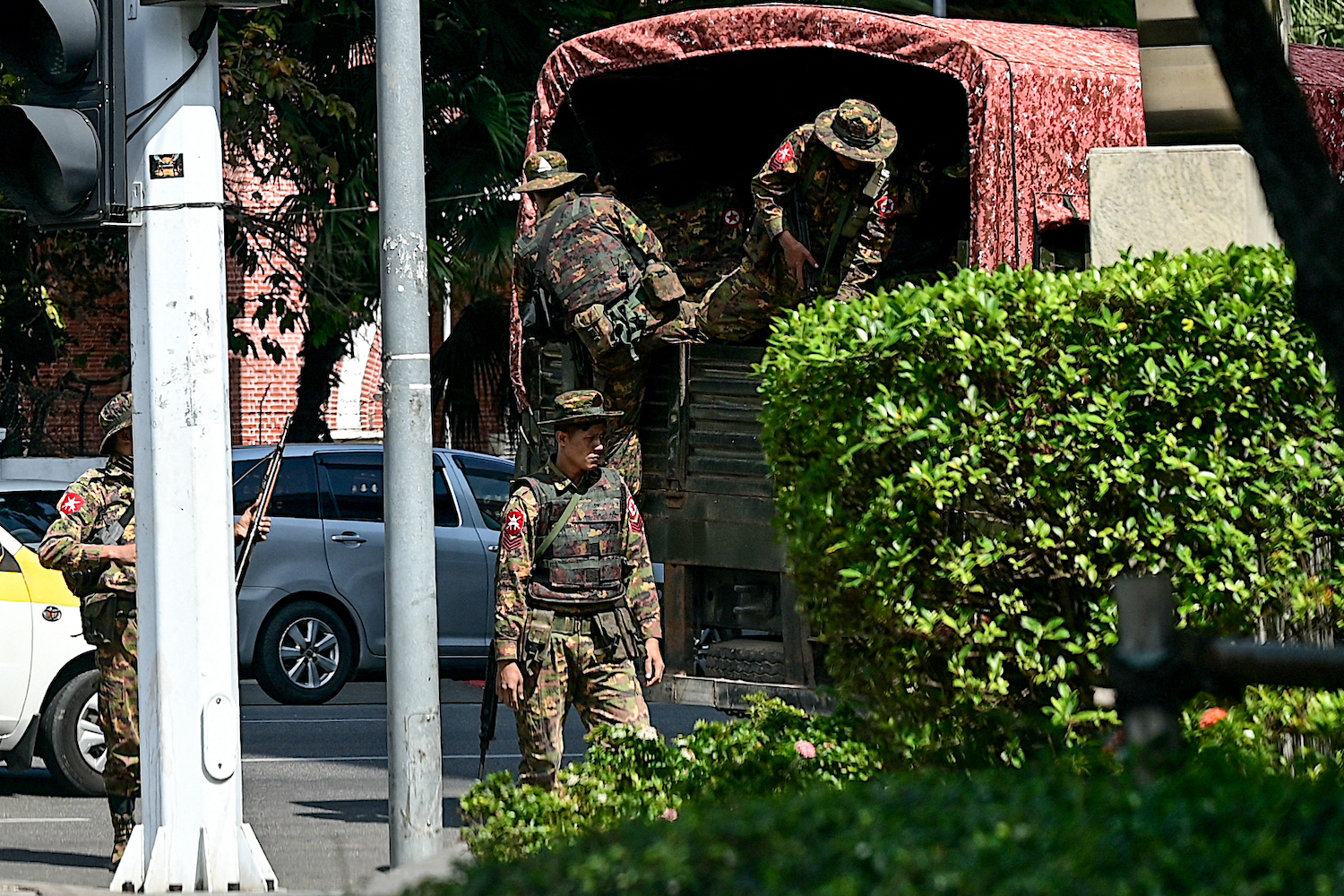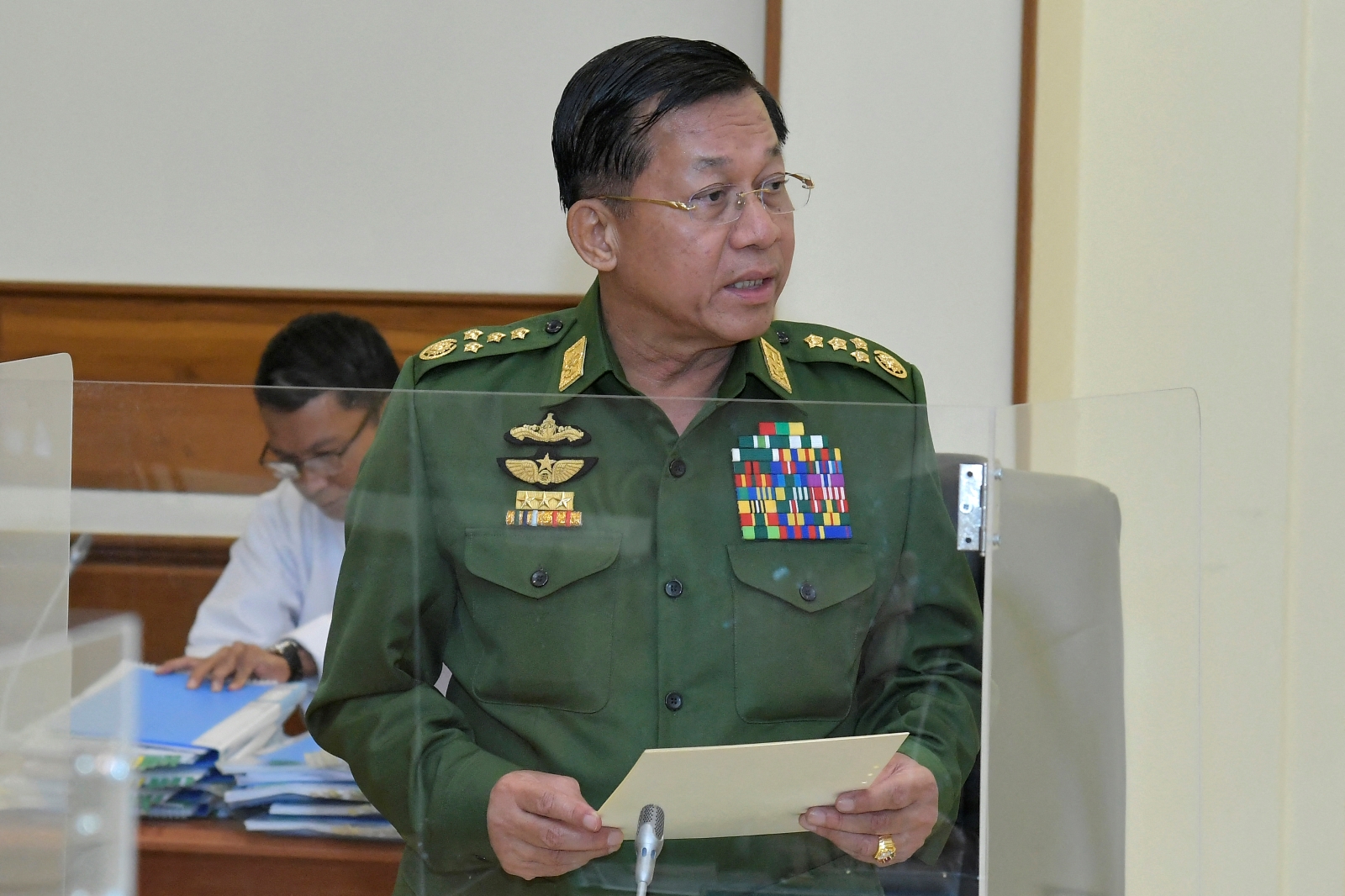Former BBC journalist Christopher Gunness played a key role in sparking the 1988 national uprising, and hopes that those bearing mental and physical wounds inflicted under junta rule will eventually be able to find closure.
By OLIVER SLOW | FRONTIER
“You saw anger, and you saw that people were terrified. You saw the Military Intelligence everywhere you looked; they were humourless and fearless, and they knew they were completely above the law.”
More than 30 years later, these remain some of the most vivid memories of former BBC journalist Mr Christopher Gunness of the mood when he arrived in a Rangoon seething with discontent in July 1988.
The country was at a tipping point. In the previous months, unprecedented protests had swept the country calling for the ouster of the military junta headed by General Ne Win, who had seized power 26 years earlier.
Gunness did not know it at the time, but he was to play a crucial role in the protests escalating into a national uprising a few weeks after his arrival.
Much of the popular fury was over the country’s fraught financial situation. Ne Win’s disastrous policy known as the Burmese Way to Socialism – a mix of Buddhism, Marxism and xenophobia – had seen Burma descend from a relatively prosperous country to a basket case. There was national shame in December 1987 when Burma was granted Least Developed Country status by the United Nations, confirming its position as one of the world’s poorest nations, in spite of its vast natural resources.
The nation’s dire economic plight was compounded by the brutality of the military-led socialist government, whose leaders acted with complete impunity. This was on full display in March 1988 when security forces resorted to astonishing violence as they tried to end a series of protests at universities throughout the capital.
The most notorious incident occurred on March 16 near a bus stop known as “White Bridge”, where Pyay Road passes Inya Lake. Here, thousands of students protesting against an earlier crackdown had been trapped between advancing soldiers and riot police. Dozens of students were killed, and there were reports that some were deliberately drowned in the lake.
So much blood was spilled on the White Bridge that the incident is remembered as the Red Bridge massacre.
Initially, the protests against the junta exclusively involved students, but as word spread about the military’s brutality, members of the public began joining the demonstrations. By June, the first mass protests were reported in cities outside Rangoon, including Mandalay, Moulmein (now known as Mawlamyine) and Taunggyi. The protests continued to escalate, leading to the huge nationwide strike on August 8, 1988.
Gunness had been following developments from London, where he was a reporter on the Asia desk of the BBC World Service. He had joined the BBC in 1982 after graduating from Oxford University, and admits to being a rookie waiting for his first big assignment when the Burma story broke. Because it was the northern summer, many experienced journalists were away on leave; Gunness got his chance because he was the only reporter available.
In Burma, the situation was continuing to deteriorate. In early July, the ruling Burma Socialist Programme Party announced that an emergency congress would take place in Rangoon at the end of the month.
Gunness was told to get a flight to Rangoon, pose as a backpacker and begin reporting undercover.
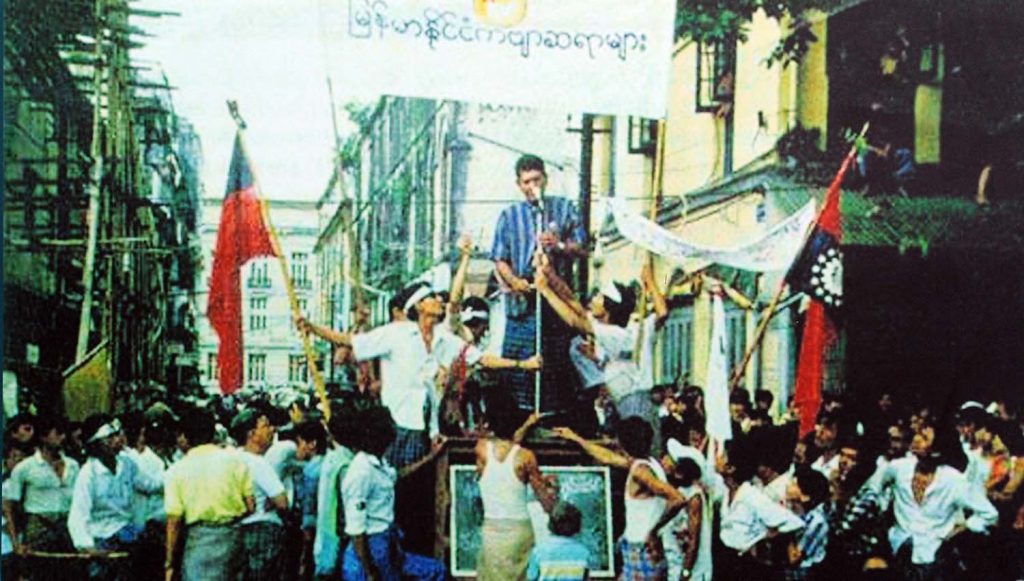
A ‘shell-shocked’ country
On arrival, Gunness checked into the Strand Hotel (“rat-ridden and decaying in those days”) and tried to get up to date on developments. A Rangoon-based BBC Burmese Service stringer quit soon after Gunness arrived amid concern over his own safety.
A few days later at the BSPP congress, Ne Win surprised the nation by announcing his resignation from the party and proposing a national referendum on whether to return to a multi-party system of government.
“I remember going through Rangoon in a taxi that night, and nobody knew what the hell to make of this,” Gunness said at the Irrawaddy Literary Festival in Mandalay in November 2019. “It was like a political earthquake. People were angry, but also completely confused and shell-shocked.”
However, it quickly became clear that there was to be no real change. Ne Win was “permitted to resign” as chairman of the BSPP, but remained a party member. A few days later, the BSPP announced that Ne Win would be replaced as chairman by Brigadier-General Sein Lwin, who was responsible for the White Bridge incident and other atrocities, and had been granted the grim moniker the “Butcher of Rangoon”. As veteran journalist Bertil Lintner wrote in Outrage, his book about the 1988 protests, “at the time of his appointment, Sein Lwin was probably the most hated man in Burma”.
Immediately after Ne Win announced his resignation, Gunness was told by his editor to break cover and begin filing on-the-record. His dispatches were being broadcast over the BBC World Service and translated for its Burmese service, one of the few outlets through which an information-starved population could gain any insight into what was happening.
“Social media didn’t exist, and the BBC Burmese Service was the Twitter of the revolution, and I was the person writing the tweets,” Gunness said. “There was the BBC morning edition, and the BBC evening edition, and you could see the country come to a stop twice a day to listen.”
The decision to report on-the-record worked in Gunness’s favour. A few days later he returned to his hotel room to find an anonymous note on his bed. “Be at the entrance of the Sule Pagoda at nine tomorrow,” it read. “We have news for you.”
Gunness was there at the appointed hour, ushered into a car and driven to a safe house on Rangoon’s outskirts to interview a group of students.
“I asked about four or five questions. Then I said, ‘Right, I want to do the same thing in Burmese’, because we had a Burmese service and you always wanted to broadcast in original voices,” he said. “Knowing that I didn’t speak Burmese, one of the students seized the moment, and slipped into his answer that a general strike was planned. He said: ‘It will start at eight minutes past eight, on the eighth day, of the eighth month of 1988’.”
“Of course, I had no idea that the interview I had just recorded would start a revolution,” Gunness said. The interviews were recorded on cassette tapes that were smuggled out of the country in diplomatic bags and sent to the BBC’s London headquarters.
Gunness later found out that the man who had organised the interviews was a 42-year-old human rights lawyer, U Nay Min. He was a friend of the switchboard operator at the Strand and she had tipped him off about the reporter’s presence.
As well as the students, Nay Min also arranged for Gunness to interview an economist about the country’s dire financial situation, as well as a former soldier.
“[The soldier] talked about the abuses in ethnic minority areas, and specifically how they were using children [as human mine detectors, walking in front of soldiers]. Until then, you had Amnesty [International] saying it, but the generals dismissed it as propaganda. But suddenly, for Burmese people to hear the voice of a soldier admitting this, I think they found it deeply shocking. So, you had the package of students, the economy, and now the human rights argument,” he said.
The encounter with Nay Min started a decades-long friendship. Gunness holds him in high respect, as one of the many heroes who helped share with the world what was happening in Burma.
“He realised that the internal dynamics of Burma were not going to change much when you had an army that was prepared to shoot dead its own countrymen,” Gunness said. “So, he thought that by using the BBC, and getting the message out on the World Service that international dynamics could be created, to force change.”
“I think he looked at me, and he saw this cub reporter and probably rubbed his hands together with glee,” Gunness said, laughing. “And not only did Nay Min have a strategy, he had a plan worked out in detail.”
It was a plan that worked. The interview with the student who called for revolution was broadcast on the BBC’s Burmese service a few days later.
As Gunness told Frontier: “It was a broadcast that fired the starting gun on a revolution, and sealed the fate of the nation.”

The national uprising
Sule Pagoda was the rallying point for the protests in Rangoon. Shortly after 8am on August 8, dockworkers downed their tools, as did others throughout the city, and marched towards the pagoda. Similar marches were held in other cities and towns across the country.
Momentum had been building for months and people from all walks of life, including public servants and Buddhist monks, joined the marches – the biggest anti-government protests the country had seen.
By midday, thousands of people had gathered at Sule Pagoda, chanting and singing songs. The mood was festive throughout the day as protestors belted out the national anthem, army songs, and chants calling for the firing of Sein Lwin, as well as an end to totalitarian rule.
The celebratory mood prevailed until late into the night, and thousands were still gathered around Sule Pagoda at midnight. Soldiers monitoring the protests had sat idle all day, but that changed in the early hours of the morning. Trucks full of troops emerged from behind City Hall, opposite Sule Pagoda, and began shooting into the crowd. The death toll from that incident is not known, but estimates put it in the hundreds.
The military’s ruthlessness then came to the fore and the crackdowns increased in intensity over the next few days. But in spite of the military’s brutal attempts to suppress the protests, the demonstrations continued for the next few weeks.
Gunness wasn’t in Burma to witness these events. Soon after the interview with the student was broadcast, an official at the British embassy told Gunness he was at risk of being arrested and advised him to leave the country. He travelled to Dhaka and continued reporting from a hotel room in the Bangladeshi capital.
What happened in Burma over the next few weeks is well documented. The protests continued into late August and early September, with demonstrators continuing their calls for the military regime to stand down. However, the army held firm, refusing to give into the demands.
Then, on September 18, an announcement came over the radio.
“In order to bring a timely halt to the deteriorating conditions on all sides over the country, and in the interests of the people, the defence forces have assumed all power in the state with effect from today,” the announcer said.
A coup had taken place. The president, U Maung Maung – a lawyer, academic and member of the BSPP central committee who had replaced Sein Lwin in mid-August – was removed, and former armed forces commander General Saw Maung was put in charge. Saw Maung oversaw the creation of the military junta known as the State Law and Order Restoration Council, which had a rather ominous sounding acronym, SLORC.
To quell the protests, SLORC almost immediately promised an election. It took place in 1990 and the newly formed National League for Democracy won 392 of the 492 contested seats, but the junta ignored the result, and launched a campaign of persecution that put many NLD members in jail or under house arrest. Despite strong domestic opposition, international condemnation and economic sanctions, the military would rule for another 20 years.


Code name ‘Eastern Star’
In addition to the thousands killed between March and September 1988, many more were arrested and imprisoned.
Among them was Nay Min, Gunness’s crucial source, who the British embassy had given the code name Eastern Star (a story about the pair’s relationship was recently turned into a stage and radio play of the same name by a veteran British dramatist, Guy Slater). After the September coup, Nay Min was arrested and spent 16 years in prison, and like many others involved in the protests endured extreme torture.
“I have no regrets or guilt about what I did, because what was happening to the civilians was unfair, unjust and unlawful, and no one else at the time was addressing this matter,” Nay Min told Frontier via email about his role in the protests. “As a human being, I felt it was my duty to do the right thing. This is how I have been living my life, and I have no intention of being a hero, nor do I want to be one.”
While Nay Min was languishing in prison, Gunness went on to have a successful career, first with the BBC and then as a director of communications for the United Nations in the Middle East. In this latter role, he has been an outspoken critic of the Israeli occupation of Palestine, the blockade of Gaza and the dispossession of the Palestinians.
Gunness admits to feeling considerable guilt about what happened to Nay Min after the BBC correspondent left Burma. When Gunness returned to Myanmar in 2013 to commemorate the 25th anniversary of the 8-8-88 uprising, Nay Min initially refused to see him. Nay Min’s tormentors in prison had falsely told him he was betrayed by Gunness at the time of his arrest.
However, the pair eventually met and reconciled.
“Many tears were shed,” Gunness said of their meeting. They remain in touch.
Nay Min said the pair’s relationship is like that of an uncle and nephew.
“There is no need at all for him to feel guilty. I can understand that he would be very upset about someone he cares about going through hardship, but it was my decision,” he said.

Looking ahead
Gunness returned to Myanmar for a third time in late 2019 to attend the Irrawaddy Literary Festival in Mandalay, where Slater’s Eastern Star radio play had its premiere.
“I’m incredibly emotional,” Gunness told Frontier on the sidelines of the event. “Partly because so many Burmese people I know are dead, and so many of the people I knew in 1988 had their lives completely destroyed. Students that were about to fall in love, about to have families, about to get careers, were simply denied that, either because they were shot dead, or disabled, or put in prison for 10 or 15 years.”
As a long-term observer of Myanmar, Gunness said he had been shocked by some recent developments, most notably what he described as State Counsellor Daw Aung San Suu Kyi’s lack of values, and the treatment of the Rohingya. He believes the country’s troubles are closely linked to an inability to deal with what happened in 1988.
“The same specialist forces dispatched to Rangoon [in 1988] are the ones who committed the atrocities in Rakhine, and they’ve never been held to account,” he said. “The 33rd Light Infantry Division that was among the most murderous in 1988 has been heavily involved in the depravity in Rakhine State today.”
The crushing of the national uprising in 1988 was far from the only violent incident under military rule; others have included the U Thant funeral crisis in 1974, the monk-led protests in 2007 known as the Saffron Revolution, and the massacre at Depayin in 2003 of NLD supporters accompanying Aung San Suu Kyi on a national tour.
There are tens of thousands, perhaps millions, of Myanmar who have never received justice, or even recognition, for what they endured under military rule.
Nay Min agrees that many of the difficulties in Myanmar are linked to not adequately dealing with the 1988 crisis.
“We civilians have been clear about what we did and what was done to us, and as such we have opened the door to further discussions,” he said. “However, on the part of the military no proper answers have been given,” he said, and referred to a clause in the 2008 Constitution that grants impunity to former military officials for crimes committed during the decades of military rule.
Nor does Aung San Suu Kyi, the country’s de facto leader, seem particularly interested in pursuing any form of transitional justice.
In a speech in August 2017, she said that the “victims of the past, those who can’t shatter the shackles of the past” had “caused a lot of hindrances” in Myanmar’s transition.
“The past is only about learning lessons. The most important thing for us is the present,” she said.
For those who witnessed such atrocities, this is a dumbfounding attitude. How can lessons be learned if those who are grieving cannot discuss their experiences? It’s also worth remembering that many of the same abuses she is asking people to ignore are continuing in the country under her leadership, especially in conflict-affected border areas.
Although he did not suffer at the hands of the military junta, Gunness has experienced grief in his own life and recognises how crippling it can be.
“My partner of 20 years died and his homophobic family wouldn’t allow me to his funeral, and I didn’t know where he was buried,” he said. “The nightmares I had of waking up and having this terrifying fear that you don’t know where your loved ones are buried haunted me for years. That’s what thousands of people went through in Burma, and still do.”
It was only after Gunness’s husband, a former TV producer and film director, helped him locate where his late partner had been laid to rest that “the recurring nightmares stopped and I found closure”, he said.
“One of the things you have to do when you grieve is accept what happened, and Burma today has been denied the opportunity even to understand what happened, let alone lay it to rest,” he said.
“There are people in Myanmar today who do not know where their children are buried. How can they possibly move on? How can people begin to forgive others if they don’t understand what they did? How can you – as individuals and societies – have peace and reconciliation without the truth? One of the lessons from 1988, and it is a cliché, is that a country that doesn’t learn from its history is condemned to repeat it.”
This extract is adapted from Oliver Slow’s forthcoming book, “After the Junta: Why Myanmar’s military must return to the barracks”.


